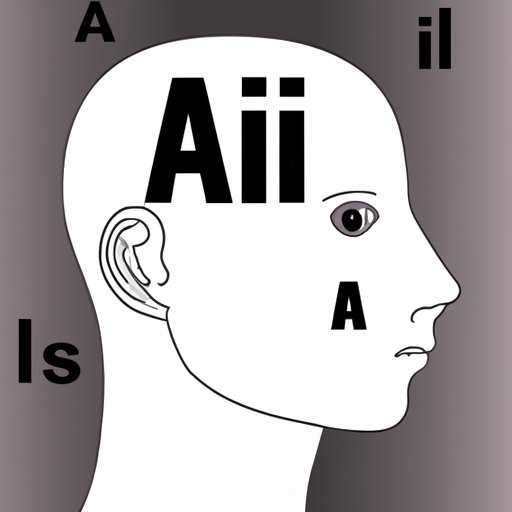Introduction
Artificial intelligence (AI) is a rapidly evolving field of technology that has the potential to revolutionize the way humans interact with machines and the world around them. On one hand, AI can provide numerous benefits, such as increased efficiency and accuracy in tasks, improved customer service, and new opportunities for businesses. On the other hand, there are also many potential drawbacks that come with the adoption of AI, such as the potential for job losses, security risks, and ethical concerns. In order to understand the potential applications and limitations of AI, it is important to examine the current state of the technology and its implications for society.

Examining the Impact of AI on Human Employment
One of the most pressing concerns associated with the development of AI is its potential to disrupt the labor market and cause job losses. Automation technologies, such as AI-driven robots and software, are increasingly being used to replace human workers in certain industries, such as manufacturing and retail. This could potentially result in large-scale job losses, particularly in sectors that rely heavily on manual labor. It is also important to consider the impact of AI on wages and working conditions. If companies begin to utilize AI to automate certain processes, they may be able to reduce their labor costs and increase their profits, which could lead to lower wages and poorer working conditions for human employees.
Exploring the Efficiency of AI in Automation
AI-driven automation can potentially improve efficiency and productivity in many industries. Automated systems can be programmed to quickly and accurately complete tasks that would otherwise require significant time and effort from human workers. This could lead to increased output, reduced costs, and higher profits for businesses. However, it is also important to consider the potential drawbacks of increased automation. For example, some experts have suggested that automation could lead to a “race to the bottom” in terms of wages and working conditions, as companies look to reduce costs by replacing human workers with automated systems.
Investigating the Security Risks Associated with AI
The use of AI in business and other areas also carries certain security risks. As AI systems become more sophisticated, they can be used to launch cyberattacks and manipulate data. Additionally, AI-based systems can be vulnerable to data breaches and leaks, which could lead to the exposure of confidential information. It is therefore essential for businesses and other organizations to ensure that their AI-enabled systems are secure and up-to-date in order to protect against these threats.

Analyzing the Challenges of Implementing AI in Business
In addition to the security risks associated with AI, there are also several technical and legal challenges that must be addressed before AI can be adopted by businesses. For example, organizations must ensure that their systems meet the necessary technical requirements for AI adoption. They must also consider the legal, regulatory, and privacy issues associated with the use of AI. Additionally, businesses must be prepared to provide training and support for employees who will be using AI-enabled systems.

Assessing the Ethical Concerns of Artificial Intelligence
The use of AI raises a number of ethical concerns that must be taken into account when developing and implementing AI-enabled systems. One of the primary concerns is the potential for unintended consequences, such as the exacerbation of existing social inequalities or the creation of new ones. There is also the potential for AI-based decisions to infringe upon human rights, or to be used for manipulation and control. Finally, it is important to consider the moral implications of AI decision making, such as the potential for decisions to be made without regard for human context or ethics.

Understanding the Limitations of AI in Decision Making
Despite the potential of AI to improve decision making, there are still some key limitations that need to be addressed. One of the main issues is the problem of bias in AI systems. AI-enabled systems can be designed to make decisions based on certain predetermined criteria, which may lead to unfair outcomes if those criteria are not carefully considered. Additionally, AI systems may struggle to accurately account for human context, such as cultural norms and values, when making decisions.
Evaluating the Potential of AI in Health Care
AI has the potential to revolutionize the health care industry by providing new opportunities for diagnosis and treatment. AI-driven systems could potentially be used to analyze medical data and make personalized recommendations for treatments based on a patient’s individual needs. Additionally, AI-enabled systems could help to improve efficiency and reduce costs in health care settings. However, there are still many challenges associated with integrating AI into existing health care systems, such as the need for reliable data and careful consideration of privacy issues.
Conclusion
AI technology has the potential to provide numerous benefits, but it is important to consider the current limitations of the technology. The use of AI can have an impact on human employment, with potential job losses and deteriorating wages and working conditions. Additionally, AI-driven automation can increase efficiency, but it also carries certain security risks and implementation challenges. Furthermore, ethical considerations must be taken into account when developing and using AI-enabled systems. Finally, AI systems have certain limitations in terms of decision making, which must be addressed in order for AI to reach its full potential. Despite these limitations, AI still holds great promise for the future.
(Note: Is this article not meeting your expectations? Do you have knowledge or insights to share? Unlock new opportunities and expand your reach by joining our authors team. Click Registration to join us and share your expertise with our readers.)
